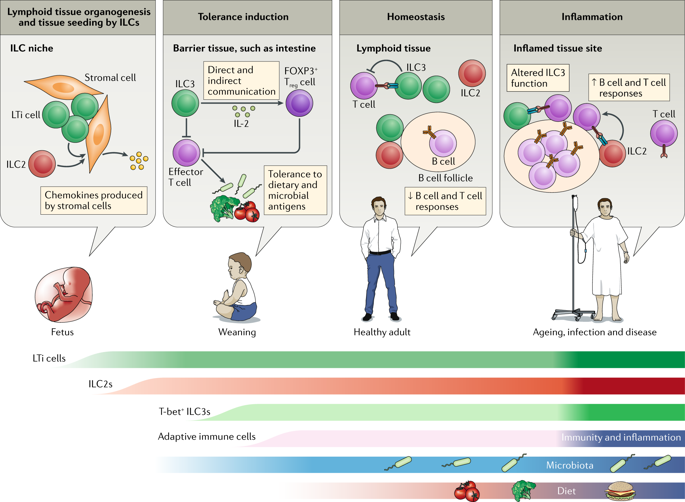Nature Reviews Immunology ( IF 67.7 ) Pub Date : 2019-07-26 , DOI: 10.1038/s41577-019-0194-8 Gregory F Sonnenberg 1 , Matthew R Hepworth 2

|
Innate lymphoid cells (ILCs) are enriched at barrier surfaces of the mammalian body where they rapidly respond to host, microbial or environmental stimuli to promote immunity or tissue homeostasis. Furthermore, ILCs are dysregulated in multiple human diseases. Over the past decade, substantial advances have been made in identifying the heterogeneity and functional diversity of ILCs, which have revealed striking similarities to T cell subsets. However, emerging evidence indicates that ILCs also have a complex role in directly influencing the adaptive immune response in the context of development, homeostasis, infection or inflammation. In turn, adaptive immunity reciprocally regulates ILCs, which indicates that these interactions are a crucial determinant of immune responses within tissues. Here, we summarize our current understanding of functional interactions between ILCs and the adaptive immune system, discuss limitations and future areas of investigation, and consider the potential for these interactions to be therapeutically harnessed to benefit human health.
中文翻译:

先天性淋巴样细胞与适应性免疫之间的功能相互作用。
先天性淋巴样细胞 (ILC) 在哺乳动物身体的屏障表面富集,在那里它们快速响应宿主、微生物或环境刺激以促进免疫或组织稳态。此外,ILC 在多种人类疾病中失调。在过去十年中,在识别 ILC 的异质性和功能多样性方面取得了实质性进展,这揭示了与 T 细胞亚群的惊人相似之处。然而,新出现的证据表明,在发育、稳态、感染或炎症的背景下,ILCs 在直接影响适应性免疫反应方面也具有复杂的作用。反过来,适应性免疫相互调节 ILC,这表明这些相互作用是组织内免疫反应的关键决定因素。这里,











































 京公网安备 11010802027423号
京公网安备 11010802027423号